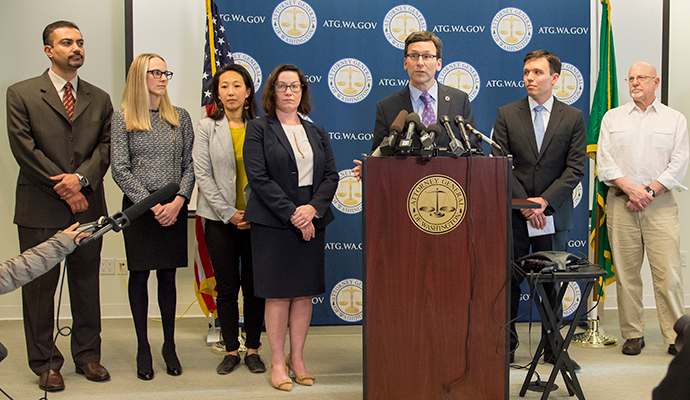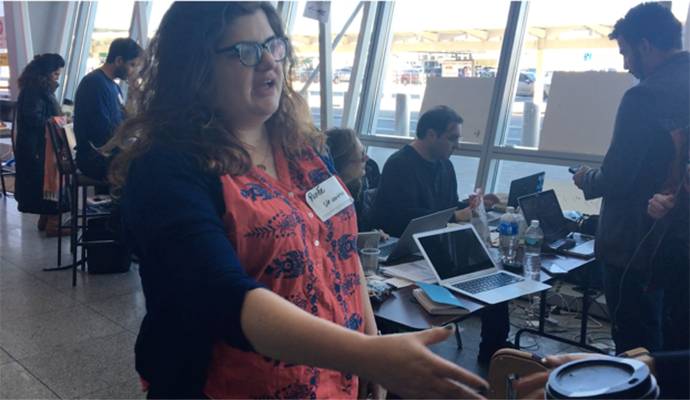Alumni Offering Advocacy and Legal Assistance After the Immigration Order
An assistant state attorney general working on a lawsuit challenging the executive order restricting immigration. A solo practitioner who answered the call for volunteers at airports. And an Amnesty International attorney organizing briefings on Capitol Hill.
These are just some of Columbia Law School’s alumni playing major roles as public interest lawyers and advocates after President Donald Trump's immigration order, also called the “travel ban.” (The Jan. 27 order banned citizens of seven Muslim-majority countries from entering the United States.) Since then, many Law School alumni have been at the forefront, working for nonprofit advocacy groups and as part of the government. Here, three alumni—Patricio Marquez ’03, Renée Paradis ’03, and Naureen Shah ’07—tell their stories.
Interviews were lightly edited for clarity and space.
Patricio Marquez ’03 (far left) attends a press conference regarding Washington’s challenge to the executive order with the state’s attorney general, Bob Ferguson (at podium). |
Patricio Marquez ’03
Seattle, Washington
Title: Assistant Attorney General, Civil Rights Unit, Washington Attorney General’s Office
Role: A member of the team that filed the successful motion for temporary restraining order against the executive order, leading to a nationwide injunction of the immigration ban.
“I vividly remember that Saturday evening [after the executive order was signed]. There were demonstrations and protests, and stories were already starting to emerge about the impacts the executive order was having on families—not only those who were waiting in the U.S. and in Washington state to receive family members who were returning from abroad, but also individuals who were coming from abroad.
“The next very salient moment for me was sitting in court [on Feb. 3], when [U.S. District Court] Judge [James] Robart granted a motion for temporary restraining order. My teammates and I, who had worked so hard—because we believed in what we were doing and the impact that it would have—really had a hard time containing our emotions…given that Judge Robart did grant a nationwide injunction, and we knew that was going to have immediate impact.
“If I’m remembering correctly, the deadline that the district court set for the [federal] government to respond to [our] motion for temporary restraining order was the night before the [Feb. 3] hearing. We’d been working pretty hard, and we knew we had to have a team ready to go. I was in the office by 1 a.m. to take the first stab at reviewing the [Trump administration’s] papers, looking at some of the arguments being made…so that our solicitor general could be prepared for the hearing that day. So it’s been quite a whirlwind.
“I’m grateful to be in this position. I had been in private practice before working in the attorney general’s office, and I’ve certainly discerned a different sense of power and capacity that comes with being an attorney for a state government, and the ability to make an impact, but also I think a sense of responsibility and accountability to wield that power and that authority responsibly, ethically.
“One of the differences of working this hard on something like this—there’s just a different level of urgency and a different sense of purpose that has provided a separate source of fuel that I don’t think I’ve quite ever experienced. The will is strong.”
Renée Paradis '03 works with other No Ban JFK volunteers at the airport on Feb. 4, 2017, the day after the Washington state decision came down. |
Renée Paradis ’03
New York City
Title: Solo Practitioner
Role: Joined the No Ban JFK initiative, a group of volunteer attorneys helping out those affected by the implementation of the executive order at JFK airport; now an organizer for the group’s steering committee.
“Trump’s election really activated me to be much more aware of organizing and volunteering opportunities in my community. When the call for lawyers came out, I was already en route [to JFK airport], planning to go to the protests that were happening. It seemed like something that I needed to do.
“I don’t have a lot of immigration experience. I did some work as a law student with the ACLU’s Immigrants’ Rights Project [with Lee Gelernt ’88]…what I did have was a lot of skill in organizing these kinds of volunteer efforts. I’ve worked on both of the Obama campaigns, and more recently I was the national voter protection director for the Bernie Sanders campaign. In addition to having legal chops, I also have an understanding of how to work in that space, and so I ended up taking over some of the organizing pieces of it. The one thing that makes America “America” has to be that we’re welcoming to immigrants regardless of race or creed or where they come from. Especially in New York…where people land from around the world, and it just felt so vital to defend that as much as possible.
“[During this time] I [had] a client who [was] stuck in Jordan...She married an American citizen about two years ago, and her visa came through just moments before they booked their flight, but their flight left after the executive order, so she [couldn’t] get on the plane. She [was] stuck in Jordan without any of her family, unable to come into the United States.
“[Our organization is] trying to get all our systems in place and make sure that anyone referred to us gets help. We’re figuring out what the future of this project looks like…and that we’re able to learn from this experience for what we all feel will be the next fire drill at some point.”
Scott Cooper at #MuslimBan Senate BriefingToday we urged Congress to stop the #MuslimBan by sharing stories from those impacted. Text AMNESTY to 21333 to tell your Senator to act now. #NoBanNoWall
Posted by Amnesty International USA on Tuesday, February 14, 2017
Naureen Shah ’07 (left) at a Feb. 14 Senate briefing on Capitol Hill.
Naureen Shah ’07
Washington, D.C.
Title: Director, Security and Human Rights Program, U.S. section of Amnesty International
Role: Spokesperson for Amnesty International and organizer of a briefing on the impact of the executive order for congressional staffers.
“Amnesty has been mobilizing its members around the world and the country to oppose the executive order and highlight the real human toll on refugees and people from these banned countries. We’ve been documenting what’s happening at ports of entry in the United States...We’ve been trying to highlight those human stories in media, and also on Capitol Hill. My role as a spokesperson, but also as a person who’s trying to connect with people in power, is to get them to understand the kind of impacts we’re seeing on the ground, and to understand the degree of public opposition to this executive order.
“I think until you’re confronted with the individuals who are impacted, as a policymaker you have no sense of the magnitude of the harm caused by the executive order. You have to be confronted with an individual human being and a story of what happened to an individual to really feel that.
“We read articles but that’s not really the same thing as talking to a woman from Sudan who escaped persecution with so much hope in her heart for her life here. We had this woman come down from Connecticut. She spoke at our Senate briefing earlier this week. Even after Donald Trump was saying these things on the campaign trail, she would tell other refugees who had settled in the U.S., ‘Don’t worry. They can’t do that stuff, because America has laws, and we’re safe here now.’ That [she] fled persecution, moved to the United States, was trained as an accountant and now works at Whole Foods, and takes a day off from work to come down here and talk to senators—she does that because she believes so much in our country and our ideals. And this executive order is devastating to what she believes. I think people just have to get that. That’s why I think the human story is so important.
“It took us decades, if not centuries, to get to the point where we are now, with binding legal obligations upon countries to help refugees and permit asylum seekers the chance to actually stay. This executive order—and the entire attitude of the Trump administration—reflect an ignorance or complete disinterest in the protection of human rights. So what’s at stake here is not just the people who are impacted right now, but everybody, hundreds of thousands of people in the future, people who will not be able to resettle in the United States if this order becomes a long-term ban. When the United States turns its back on the largest refugee crisis since World War II, it sends a signal to governments all over the world that the laws we all labored to create over decades don’t mean a thing. It’s a serious attack on not just human rights itself, but the whole legal order that was created after the horrors of World War II, when countries came together and said, ‘Never again.’
“I would say to law students at Columbia, or aspiring law students at Columbia, that we will need their help. This is the most challenging time I have ever witnessed in my career as a lawyer, and we need more brains, more people willing to volunteer a lot of time, and to dig in.”
Other Columbia Law School graduates in key roles:
Lee Gelernt ’88
Title: Deputy Director, ACLU’s national Immigrants’ Rights Project
Role: Lead attorney on Darweesh v. Trump, which resulted in a nationwide temporary injunction of the executive order on Jan. 28, 2017.
Lee Gelernt '88, deputy director of the ACLU's national Immigrants' Rights Project and lead attorney on Darweesh v. Trump, shares his on-the-ground story of the first challenge to the travel ban. Watch now live
Posted by Columbia Law School on Thursday, February 23, 2017
Naz Ahmad ’14
Title: Staff Attorney, Creating Law Enforcement Accountability & Responsibility (CLEAR) Project at CUNY School of Law
Role: Her work aims to address the legal needs of minority communities affected by national security and counter-terrorism policies.
“Rights and Resilience: Responding to the Executive Order on Immigration,” Columbia University (Feb. 3, 2017)
Aziz Huq ’01
Title: Frank and Bernice J. Greenberg Professor of Law, University of Chicago Law School
Role: Filed an amicus brief against the executive order in the 9th Circuit Court of Appeals on behalf of several Muslim groups.
“Opposing Arguments on Immigration Order,” The Brian Lehrer Show (Feb. 6, 2017)
Do you know of other alumni playing a role? We are interested in interviewing alumni working on all sides of this issue. Please email us at [email protected].
###
Posted on March 2, 2017

